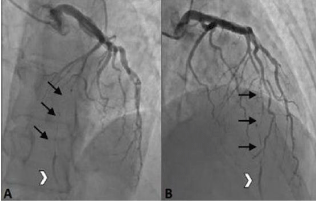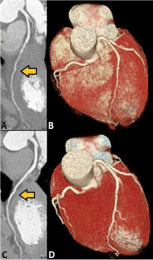
Special Article - Acute Coronary Syndrome
Austin Cardio & Cardiovasc Case Rep. 2018; 3(1): 1020.
Challenges for the Management of Pregnancy-Related Spontaneous Coronary Artery Dissection
Scagliola R*, Brunelli C and Balbi M
Cardiovascular Disease Unit, IRCCS OspedalePoliclinico San Martino and Department of Internal Medicine, University of Genova, Italy
*Corresponding author: Riccardo Scagliola Cardiovascular Disease Unit, IRCCS OspedalePoliclinico San Martino and Department of Internal Medicine, University of Genova, Italy
* DePersis M, Division of Cardiology, Robert Packer Hospital, Guthrie Health Systems, Sayre PA, USA
Received: March 30, 2018; Accepted: April 23, 2018; Published: April 30, 2018
Keywords
Spontaneous coronary artery dissection (SCAD) is an uncommon and multifactorial cause of acute coronary syndrome, which particularly affects young healthy pregnant women. The management of such patients is still controversial: to treat or not to treat invasively? Here is reported the case of a 42-year-old pregnant woman with an unremarkable past medical history. She was found to have an isolated SCAD to the left anterior descending coronary artery, resulting in cesarean delivery of a normal child and managed by conservative medical treatment. The uneventful clinical course with a spontaneous and progressive vessel recanalization ruled in favor of such choice.
Keywords: Spontaneous Coronary Artery Dissection; Acute Coronary Syndrome; Pregnancy; Coronary Computed Tomography; Conservative Treatment
Core Tip
Lacking a uniform recommendation concerning the treatment of pregnancy-related spontaneous coronary artery dissection, the management of such condition remains still debated and mainly addressed by the patient’s characteristics. Taking into account to optimize the revascularization strategy on the basis of clinical and hemodynamic parameters, this case underlines how in the appropriate clinical context, conservative approach with optimized medical treatment and close monitoring may avoid coronary revascularization, with spontaneous dissection healing and vessel recanalization.
Introduction
Spontaneous Coronary Artery Dissection (SCAD) is an infrequent and under-recognized cause of Acute Coronary Syndrome (ACS), which mainly affects young healthy women, particularly during pregnancy and postpartum period [1].
Despite its management is still debated, when coronary revascularization is hardly practicable and in clinical and hemodynamic stability, a conservative strategy with careful monitoring should be considered, as shown in the present case report.
Case Presentation
A 42-year-old Caucasian woman at the 38th gestation week of her second child was admitted to the Emergency Department with diagnosis of anterior ST-elevation myocardial infarction. She had no personal medical history, nor cardiovascular risk factors, and her first pregnancy was free of any complication.
On admission, the patient was conscious and in stable clinical conditions. Arterial blood pressure was 125/70mmHg; heart rate 87bpm, respiratory rate 18/min and oxygen saturation 95% in room air. On physical examination, the chest was clear to auscultation and percussion bilaterally, heart findings were unremarkable, uterus was optimal for the gestation week and the other system assessments were within normal limits.
Transthoracic echocardiography showed normal left ventricular size and wall thickness, with hypo kinesis of cardiac apex and interventricular septum and depressed ejection fraction at 40%.
The patient was then referred to Hemodynamic Unit, where coronary angiography showed a subocclusive spontaneous Coronary Artery Dissection (SCAD) involving the middle-distal Left Anterior Descending (LAD) coronary artery, just beyond the first diagonal branch (Figure 1). Considering the lack of symptoms, the stable hemodynamics and the distal coronary involvement, of small caliper, the obstruction was decided to be managed with conservative treatment, without percutaneouscoronary angioplasty.

Figure 1: Coronary angiography findings. Cranial left anterior (A) and
right anterior (B) oblique angiographic projections showing amid-to-distal
subocclusive LAD dissection (black arrows) with distal dye stasis (arrowhead).
LAD: left anterior descending coronary artery.
Subsequently, due to the risk of acute fetal distress and considering the patient’s gestational age, emergency cesarean section was performed. After cesarean delivery, the baby was referred to Neonatal Unit, while the mother was transferred to Coronary Intensive Care Unit for monitoring.
Troponin I concentration was 0.029ng/mL in the blood sample at admission, while the peak value reached 71.6ng/mL (normal range: 0-0.045ng/mL).
Five days later, Coronary Computed Tomography (CT) showed a partial vessel recanalization, with a remaining narrowing of the middle LAD and a hypodense surrounding soft tissue beyond the origin of the first diagonal branch, compatible as an Intramural Hematoma (IMH) (Figure 2 A,B).
The rest of clinical stay was uneventful, and the patient was discharged with a1-year dual antiplateled therapy (aspirin 100mg and clopidogrel 75mg), pantoprazole 40 mg, bisoprolol 1.2 mg, ramipril 2.5mg and atorvastatin 40mg.
A subsequent one-month follow-up CT revealed a near total dissection healing, without residual significant stenosis and a progressive IMH reabsorption (Figure 2 C,D).
Discussion
SCAD is an under-recognized cause of ACS, accounting for 0.7- 1.1% in published angiographic series [2]. It mainly affects young and otherwise healthy women, with a higher prevalence during peripartum (26-38% of all SCAD, of which approximately one third in late pregnancy and two thirds in the early puerperal period) [1,3]. Patients with pregnancy-related SCAD tend to have more sinister presentation, larger infarcted area and worse left ventricular function compared with those with SCAD related to other etiologies [4].
Although the role of pregnancy in the pathogenesis of SCAD is still unclear, hormonal and hemodynamic changes seem to play a pivotal role in modifying the normal arterial wall architecture, leading to coronary dissection [5]. Estrogen and progesterone surges are thought to drive structural connective tissue changes, including impaired collagen synthesis, increased medial mucopolysaccharide content and fragmentation of the elastic fibers, resulting in weakened media and susceptibility to SCAD [3,4]. On the other hand, the risen cardiac output and circulatory volume may increase hemodynamic shear forces, which predispose to SCAD [5,6]. Furthermore, concomitant driving pathways, such as fibro muscular dysplasia, may favor arterial beds to injury in non-atherosclerotic SCAD, including pregnancy-related coronary dissections [4,7].
Despite coronary angiography is considered the first line diagnostic approach, occasionally it may be difficult to recognize SCAD [2,8]. Particularly in no atherosclerotic SCAD, the dissection plane lies in the outer one-third of the media, leading to a no communicating IMH, which may successively access the true lumen forcing the medial-intimal layer [2].
In the present case, the ambiguous subocclusive stenosis of the middle LAD with a distal dye stasis and the otherwise remaining normal coronary arteries, raised the suspicion of SCAD, which was confirmed by further additional angiographic views (Figure 1).
Currently, there are no specific recommendations for the management of SCAD [3]. Treatment should be individualized, considering the site and extent of the dissection, number of vessels involved, the patient’s hemodynamics and availability of therapeutic facilities [1]. In hemodynamically stable patients, with distal vessel involvement and restored coronary flow, conservative treatment has resulted in a good long-term clinical outcome, especially because the majority of SCAD heal spontaneously [4,8]. Moreover, in case of distal dissected coronary segments, of small caliper, or with extensive dissections, percutaneous revascularization is hardly practicable, and over possible, it requires longer stents application, thus increasing the risk of intra-stent restenosis [6].
In our patient, considering the lack of symptoms, stable hemodynamics, and the extent and caliper of dissected LAD, we preferred to carry on adopting a conservative strategy, with medical therapy and close monitoring by non-invasive coronary CT. The patient’s uneventful course and the spontaneous vessel recanalization ruled in favor of such choice (Figure 2).

Figure 2: Non-invasive imaging assessment at the follow-up. Curved
multiplanar projection and 3D volume rendering CT at five-day (A;B) and onemonth
follow-up (C;D) showing a spontaneous vessel recanalization, with
progressive IMH reabsorption (yellow arrows). CT: computed tomography;
IMH: intramural hematoma.
In conclusion, SCAD may represent a leading cause of ACS in pregnant women with a low cardiovascular risk profile, with a potential lethal outcome for the mother and child. Taking into account to individualize SCAD treatment on the basis of the patient’s characteristics, in the appropriate clinical context a ‘wait and watch’ strategy with a conservative approach and careful monitoring should be considered.
Informed Consent Statement
Written informed consent was obtained from the patient.
Any details which might disclose the identity of the subject in the paper have been omitted or anonymized.
Authors Contribution
All authors substantially contributed to this paper. All of them participated in drafting the article, revised it critically, read and approved the final version of the manuscript.
References
- Magarkar V, Lathi P. A case of spontaneous coronary artery dissection in early pregnancy managed by PCI. Indian Heart J. 2016; 68: S25-S27.
- Andreou AY, Georgiou PA, Georgiou GM. Spontaneous coronary artery dissection: Report of two unsuspected cases initially treated with thrombolysis. ExpClinCardiol. 2009; 14: e89-92.
- Tanis W, Stella PR, Kirkels JH, Pijlman AH, Peters RH, de Man FH, et al. Spontaneous coronary artery dissection: current insights and therapy. Neth Heart J. 2008; 16: 344-349.
- Vijayaraghavan R, Verma S, Gupta N, Saw J. Pregnancy-related spontaneous coronary artery dissection. Circulation. 2014; 130: 1915-1920.
- Yip A, Saw J. Spontaneous coronary artery dissection-A review. Cardiovasc Diagn Ther. 2015; 5: 37-48.
- Saw J. Spontaneous coronary artery dissection. Can J Cardiol. 2013; 29: 1027-1033.
- Saw J, Ricci D, Starovoytov A, Fox R, Buller CE. Spontaneous coronary artery dissection: prevalence of predisposing conditions including fibro muscular dysplasia in a tertiary center cohort. JACC Cardiovasc Interv. 2013; 6: 44-52.
- Das Neves BC, Núñez-Gil IJ, Alfonso F, Hernández R, Cuevas C, Jimenez Quevedo P, et al. Evolutive recanalization of spontaneous coronary artery dissection: insights from a multimodality imaging approach. Circulation. 2014; 129: 719-720.